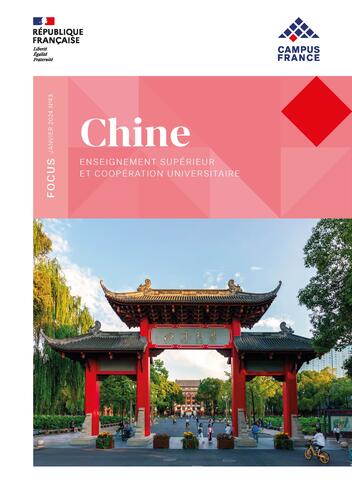
Publication of the Focus China
To supplement the Strategic Orientation Board held in China in January 2024, this Focus China presents the Chinese higher education system and describes the state of mobility and cooperation agreements with France, which were impacted by the Covid-19 pandemic, but which experiment a pick-up since then. The document describes a key player and partner in the scientific and university cooperation sector.

Ce pays est déjà, et sera dans les années à venir, l’un des protagonistes majeurs des transitions écologiques, technologiques et numériques auxquelles sont confrontées nos sociétés partout dans le monde.
Bertrand LORTHOLARY, Ambassadeur de France en Chine
L’enseignement supérieur chinois
Avec 57 millions d’étudiants et un taux brut de scolarisation dans l’enseignement supérieur qui a doublé en dix ans (de 30 % en 2011 à 60 % en 2022), l’enseignement supérieur chinois est massif et son développement a fait l’objet d’une attention prioritaire du pouvoir chinois. Le pays compte, en 2023, plus de 3 000 établissements d’enseignement supérieur. La sélection dans l’enseignement supérieur à travers les concours du Gaokao (admission dans le supérieur) et d’admission en master reste particulièrement rude. Cependant la Chine a également ajusté sa politique de massification de l’enseignement supérieur en 2019 pour favoriser la formation professionnelle.
Depuis 2015, le programme de « développement d’universités et de disciplines de premier rang mondial » (dit Shuangyiliu) a pour missions la « création d’un corps enseignant de premier plan, la formation de talents de haut niveau capables d’innover, faire progresser le niveau de la recherche scientifique, se faire l’héritier d’une culture d’excellence et la mettre à jour, s’efforcer de favoriser la valorisation scientifique ». Le programme compte actuellement 147 universités. Il s’attelle actuellement à accélérer la formation du personnel médical et enseignant dont le pays a un besoin urgent, à promouvoir l’optimisation de la répartition des ressources de l’enseignement supérieur et à améliorer la capacité de l’enseignement supérieur à soutenir et à conduire le développement économique et social régional.
Parallèlement, les universités chinoises sont de mieux en mieux classées dans les classements internationaux. En 2024, au classement QS, cinq universités chinoises sont dans le top 100 mondial, contre deux quinze ans auparavant. Deux universités pékinoises sont en tête, l’Université de Pékin (17e) et Tsinghua (25e), suivies par l’Université du Zhejiang (44e), et les shanghaiennes Fudan (50e) et Jiaotong (51e). Les deux premières sont également dans le top 3 des universités d’Asie, respectivement 2e et 3e.
La mobilité internationale des étudiants chinois
La Chine représente le pays d’origine de 17 % des étudiants internationaux à travers le monde et 42 % des mobilités d’étudiants asiatiques. Plus de 700 000 étudiants chinois partent chaque année étudier à l’étranger, pour un stock de plus d’un million d’étudiants à l’étranger. Les cinq premiers pays d’accueil des étudiants chinois sont les États-Unis, le Royaume-Uni, l’Australie, le Canada et la Corée du Sud. L’Allemagne et la Malaisie occupent les positions suivantes de ce classement, devant la France, 8e destination.
La Chine est le 3e pays d’origine des étudiants de nationalité étrangère inscrits en France en 2022-2023, avec 25 600 étudiants (dont 59% d’étudiantes), derrière le Maroc et l’Algérie (source MESR/SIES). En vingt ans, le nombre d’étudiants chinois en France a fluctué. Dans un premier temps, entre 2000 et 2010, le nombre d’étudiants chinois s’inscrivant dans des formations diplômantes en France a connu une croissance exponentielle, passant d’environ 2 000 en l’an 2000 jusqu’à près de 25 000 en 2010 ; la France accueillait jusqu’à 5 % de l’ensemble des étudiants chinois mobiles dans le monde. Lors de la décennie suivante, les effectifs accueillis en France se sont maintenus, tandis qu’ils progressaient ailleurs dans le monde : la part accueillie en France est ainsi redescendue à 2 % en 2021.
Depuis de nombreuses années, la première origine des étudiants de nationalité étrangère inscrits en doctorat en France est la Chine, devant le Liban et l’Italie. Cette mobilité contribue à faire du niveau doctorat un niveau particulièrement internationalisé, 37 % des doctorants en France étant de nationalité étrangère.

Coopération universitaire franco-chinoise
-
Cette coopération existe principalement à travers les Instituts franco-chinois (IFC), qui en sont le vecteur privilégié. En 18 ans, 21 IFC ont vu le jour, dont un avec une dimension européenne.
-
La coopération en recherche entre la France et la Chine repose sur divers instruments complémentaires et structurants tels que les programmes de soutien à la mobilité et les structures conjointes de recherche franco-chinoises. Ces structures sont reconnues par des accords signés par les entités de recherche françaises (CNRS, INRAE, universités par exemple) et chinoises (CAS, CAAS, universités…). Ces structures sont les piliers de la coopération en science et technologie, avec 56 partenariats franco-chinois en 2023, impliquant près de 300 laboratoires et plus de 2 500 chercheurs. Ces collaborations fructueuses ont donné lieu à plus de 800 articles conjoints et à 18 brevets au cours des 5 dernières années.
Dialogue de haut niveau sur les échanges humains
Le 23 novembre 2023, Catherine Colonna, ministre de l’Europe et des Affaires étrangères a présidé avec son homologue, WANG Yi, le dialogue de haut niveau sur les échanges humains à l’université de Pékin. Cette session, la 6e depuis l’instauration du dialogue en 2014, s’inscrit dans la continuité de la visite d’État du Président de la République en Chine en avril 2023 et dans l’esprit de la déclaration conjointe agréée par les deux présidents. L’enseignement supérieur, la science et la technologie ont été abordés dans le cadre de leurs échanges, avec notamment les déclarations d’intention suivantes :
-
Déclaration d’intention relative au renforcement de la coopération en matière d’enseignement supérieur et de recherche ;
-
Renouvellement du mémorandum d’entente de janvier 2018 en matière de coopération dans le domaine de la santé.
Ces textes viennent compléter d’autres coopérations agréées plus tôt dans l’année, comme la relance des programmes de soutien à la mobilité étudiante et des chercheurs tels que le Partenariat Hubert Curien « Cai Yuanpei » et le programme Jeunes Talents France Chine ou la signature le 6 septembre dernier de l’arrangement administratif entre les deux ministères de l’éducation relatif à la mise en œuvre du baccalauréat français international - section de langue chinoise.
En marge du dialogue, la ministre a participé à un symposium, organisé dans le cadre d’une semaine franco-chinoise de l’éducation, sur les cent ans de la coopération universitaire entre la France et la Chine en présence d’anciens étudiants des deux pays. Accompagnée de son homologue et du ministre chinois des sciences et des technologies, la Ministre a également assisté au lancement du site internet du centre franco-chinois pour la neutralité carbone, annoncé lors de la visite d’État d’avril 2023 et destiné à favoriser les coopérations scientifiques et technologiques dans le domaine de la neutralité carbone. Les deux ministres ont également évoqué la préparation de l’Année franco-chinoise du tourisme culturel et des célébrations du soixantième anniversaire de l’établissement des relations diplomatiques en 2024.
Related contents
Recommended News




















































